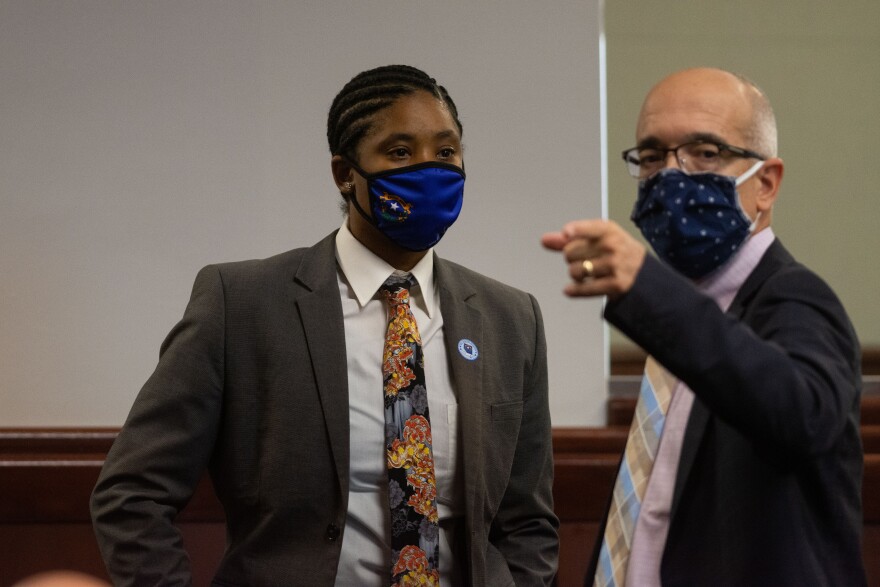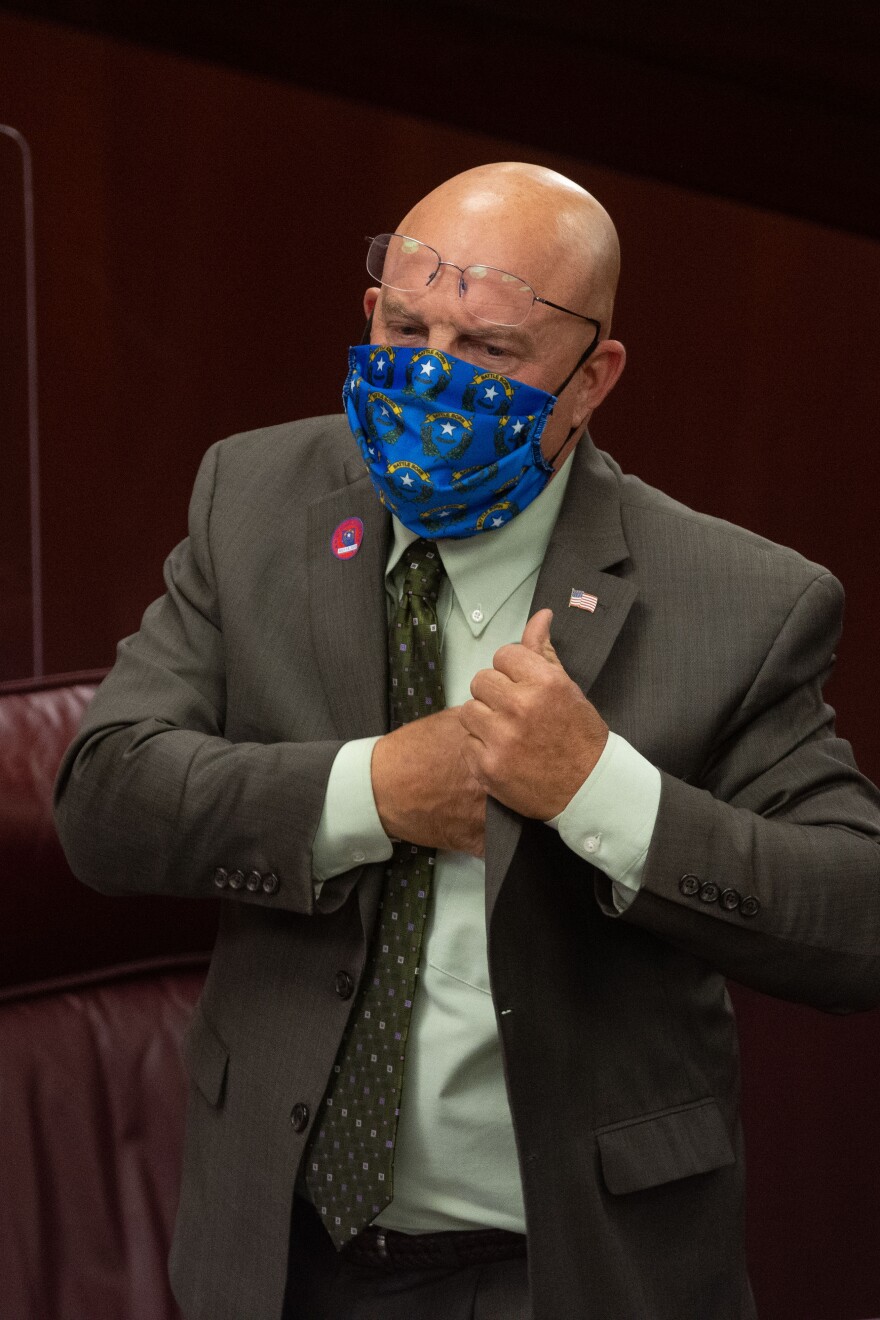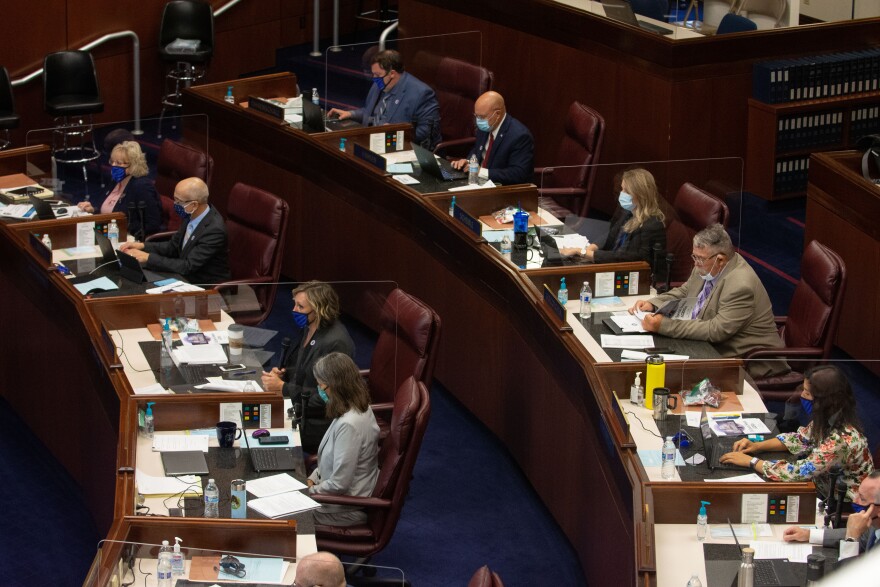Lawmakers in Nevada ended their special session to address the state's massive budget shortfall over the weekend, passing just five bills in 12 days. To help us break down that legislation, and what it means for the state, we turn now to KUNR's Paul Boger and Lucia Starbuck, who covered the session in its entirety.
Michelle Billman: A majority of the legislation that came out of this special session came out of the Senate. What were some of those bills?
Lucia Starbuck: Senate Bill 1 identified capital improvement projects to be canceled, or changed, in order to sweep $73 million into the state's general fund. Some of those cuts come from the Nevada System of Higher Education (NSHE) buildings, youth centers, correctional facilities, state legislative buildings and some outdoor projects.
Some of the bigger funds include $20 million from a new engineering building at the University of Nevada, Las Vegas, and about $8 million will be taken from general NSHE maintenance. I should also note millions are being swept from correctional facility repairs.
Lawmakers also gave the treasurer's office the ability to take out an emergency line of credit if the state can't pay its bills.

We need your support to ensure this vital reporting continues. Learn more at bit.ly/LuciaReports.
Billman: What about the big-budget bill, AB3?
Starbuck: Lawmakers spent 12 days in special session, desperately trying to find more money for the state. While they were successful in finding some additional funding, they still had to make steep cuts to education and healthcare services.
AB3 appropriates $50 million from the Coronavirus Aid, Relief, and Economic Security (CARES) Act to students affected by the pandemic. But, tens of millions are still coming out of K-12 education. NSHE also took a hit. Not only did lawmakers reduce the budget for colleges and universities by the $112 million recommended by the governor's office, they also swept an additional $25 million from NSHE into the general fund to offset cuts elsewhere.
Lawmakers were able to cancel about $80 million in cuts to health care services, like Medicaid, saving some programs considered optional services by the federal government, as well as some mental health and addiction services. However, Nevada's Department of Health and Human Services is still facing steep cuts.
Lastly, state workers can expect six days of furlough.

Democratic Senator Dallas Harris from Clark County called the cuts devastating.
"The only way I can justify taking this vote today is because I know with certainty that this fight is not over. We have historically underfunded services in this state, and it's clear now than ever, that this is not sustainable," Harris said.
Billman: Those are the cuts, but what about taxes? Did lawmakers do anything about taxes?
Starbuck: SB3 would require mining companies to prepay half of their tax liability for the next two years, with a goal of generating $58 million into the state's general fund.
It also introduces a tax amnesty program. This means those who are delinquent in paying their bills can pay them back with no penalties. Budget writers expect this would generate about $21 million into the state's general fund.
Lastly, the measure redirects the state's Governmental Services Tax, which is what you pay when you register your vehicle, from the highway fund to the general fund for next year.
Billman: That was not the only measure dealing with mining. Last week, Democrats introduced a measure aimed at effectively raising mining taxes, but that effort failed. What happened there?
Paul Boger: A little context first: mines are required to pay 5% of their net proceeds to the state annually. That rate was set in the state constitution in 1864. On top of that, mines have about a dozen different deductions that they can take to limit their tax bill. That means, last year, mining operations paid about $120 million in state and local taxes on roughly $8 billion in proceeds.
Over the course of the week, we heard time and again in public comment from health care workers, and public education advocates, a call for lawmakers to increase taxes on mining. So, Democrats took that as a Clarion call, and late Thursday evening, they unveiled a bill that would cap the amount of money mining operations can deduct from their tax bill.
Of course like any tax measure, the issue was incredibly partisan. For Democrats, it was an issue about looking for a way to increase revenues without raising taxes on poor working families.

However, Republicans argued that the measure unfairly singled out mining, an industry that almost single-handedly props up the economy of rural Nevada. Here's what Republican Senator Ira Hansen of Sparks had to say about the matter.
"The truth is we've held a gun to their head and that we have made them the whipping boy. When in fact, they are one of the best industries that Nevada has ever had. We are the Silver State after all, and mining has been great for Nevada. It's great for the rural areas and I'm disappointed that we single out one industry rather than spreading the burden across all of the industries of our state, as is the proper way, and the fair, and equitable way to do it," Hansen said.
Ultimately, it was Republicans that killed the bill. Under state law, lawmakers have to get a two-thirds majority to institute a tax increase. That means, they needed to have swayed at least one Republican in the Senate, and they couldn't do it. I will say that this is an issue that is surely going to come up again in the regular session next February.
Lucia Starbuck is a corp member with Report for America, an initiative of the GroundTruth Project.
As a note of disclosure, the Board of Regents for the Nevada System of Higher Education owns the license to this station. All KUNR employees are considered state employees.








